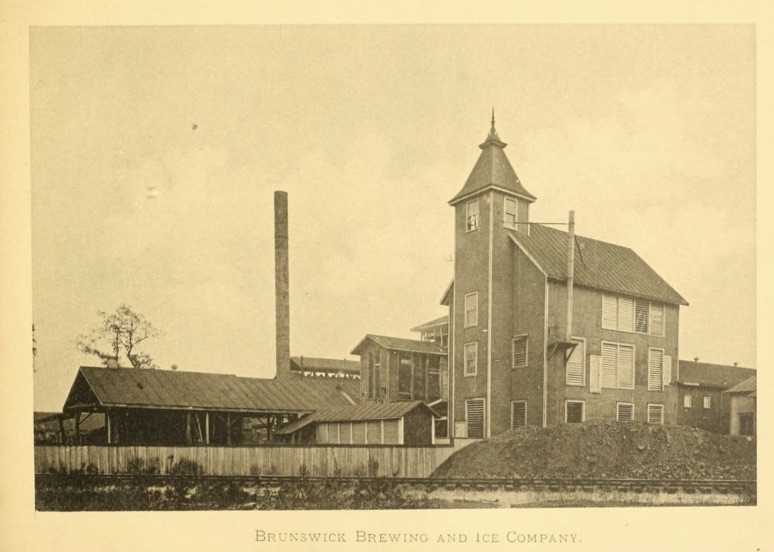
ARE YOU OVER 21?

Brunswick’s historic brewery was located downtown, and it was a short-lived experiment by a German entrepreneur named Peter Herman Wolters. This late 1800s brewery was known as The Brunswick Brewing and Ice Company, and it was an expansive facility with the capacity to brew a large amount of beer. A separate distribution facility was set up near the train tracks.
Peter Herman Wolters and his older brother Carl came to the United States in the 1860s. They were born into the Wolters brewing dynasty in Germany in the mid 1800s, and they brought their brewing knowledge with them. Their family’s brewery, Hofbrauhaus Wolters, had been open since the 1600s, and it is still open to this day. A wide variety of Hofbrauhaus Wolters’ export beers are available in the United States.
Incidentally, Hofbrauhaus Wolters is located in Braunschweig, Germany—the ancestral homeland of King George III and the city that Brunswick, GA was named after in 1771. This connection may have played a part in Mr. Wolters’ decision to open a brewery in Brunswick, GA. Much of Mr. Wolters life suggests he was very sentimental about his German homeland and its beer.
The Brunswick Brewing and Ice Company opened in 1891. At the time, a local Brunswick paper proudly proclaimed that Mr. Wolters had chosen Brunswick as the location for his brewery over several other southern cities such as Wilmington, Charleston, and Savannah—however, Mr. Wolters was actually opening a brewery in Savannah at the same time. Given that it took 14 hours to travel between Brunswick and Savannah back in those day, the paper’s embellishment likely went unnoticed.
Before arriving in Georgia, Peter Wolters worked in various parts of the United States, but he settled in Philadelphia alongside his brother Carl. During their early days in the United States, they worked as grocers and butchers, common vocations in the Wolters family. However, brewing beer was their true passion.
Historic records suggest Carl and Peter were very differently temperamentally, and they took very different paths to brewing. Carl was business-minded, stable, and enterprising, and it appears he was the unofficial patriarch of his extended family in the United States. He eventually became known as Charles (an anglicized version of his real name) and he founded the Prospect Brewing Company in Philadelphia. This was a very successful brewery for its time, and Peter’s two sons, John and Charles, were heavily involved in its operations. When Carl died in 1906, they took over the Prospect Brewing Company and kept it running until Prohibition.
Peter, on the other hand, appeared to be hopelessly passionate about beer, and it seems he was less concerned with the business of beer and more concerned with its quality. He founded the Philadelphia Brewing Academy and opened at least three different breweries over the course of his life. These three breweries include the P.H. Wolters Enterprise Brewing Company in Philadelphia, Pennsylvania; P.H. Wolters Brewing Company in Savannah, Georgia; and of course, The Brunswick Brewing and Ice Company in Brunswick, Georgia.
It’s possible Peter was drawn to Brunswick, Georgia out of sentimentality, given that the city was named after the same city as the Wolters’ family brewery in Germany. He also favored recipes that held regional significance for him. One of his beers was a Kloster (cloister) beer, which is named after the cloisters where monks brewed beer near the village where he was born. Even though cloister beer was not a common beer style in Germany, it possibly held regional significance to Mr. Wolters.
Unfortunately, the Brunswick Brewing and Ice Company did not last long. Advertisements for the brewery boasted of the high-quality Canadian ingredients that were used, but this likely made beer production very expensive. Additionally, because Mr. Wolters was brewing on a smaller scale than the beer powerhouses of the day such as Schlitz, replicating recipes and ensuring consistency and longevity was difficult. That meant Mr. Wolters could not distribute his beers widely, and only the local population was a suitable market for his product.
Although the population of Brunswick was developing a taste for German beers, local entrepreneurs such as Benjamin Hirsch operated businesses similar to modern-day growler stores. They would order large kegs of Schlitz and it would arrive via train. The shopkeepers would then fill individual bottles bearing the owner’s own name, and customers could take a few inexpensive bottles home and return the empty bottles to be refilled.
Although the Brunswick Brewing and Ice Company was short-lived, it appears Mr. Wolters’ business ventures in Savannah were successful. However, much of this time period is shrouded in mystery because business records from that time period are inconsistent. Mr. Wolters eventually put down roots in the Savannah, and his daughter Lillian also settled in Savannah with her husband and their family. When Mr. Wolters passed away shortly after the Volstead Act (i.e., the start of Prohibition), it was in a Savannah hospital.
So much of Mr. Wolters’ history suggests he would have fit right in among modern-day craft beer entrepreneurs. While we certainly hope that Silver Bluff has a longer run in Downtown Brunswick than the Brunswick Brewing and Ice Company did, we hope that Mr. Wolters’ dedication to quality will be a big part of our process.
When Silver Bluff is open, you can see artifacts from the Brunswick Brewing and Ice Company during our brewing tours. Silver Bluff has amassed a collection of historic bottles from Brunswick as well as the Wolters brewing legacy—but we’re not the only collectors in the area. The late Fred Cook of Brunswick wrote a comprehensive history on beer and soda bottling in Brunswick, Georgia that you can read here.